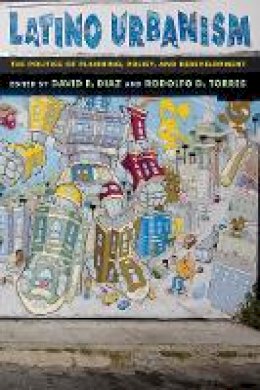
Latino Urbanism
David R. Diaz
The nation’s Latina/o population has now reached over 50 million, or 15% of the estimated total U.S. population of 300 million, and a growing portion of the world’s population now lives and works in cities that are increasingly diverse. Latino Urbanism provides the first national perspective on Latina/o urban policy, addressing a wide range of planning policy issues that impact both Latinas/os in the US, as well as the nation as a whole, tracing how cities develop, function, and are affected by socio-economic change.
The contributors are a diverse group of Latina/o scholars attempting to link their own unique theoretical interpretations and approaches to political and policy interventions in the spaces and cultures of everyday life. The three sections of the book address the politics of planning and its historic relationship with Latinas/os, the relationship between the Latina/o community and conventional urban planning issue sand challenges, and the future of urban policy and Latina/o barrios. Moving beyond a traditional analysis of Latinas/os in the Southwest, the volume expands the understanding of the important relationships between urbanization and Latinas/os including Mexican Americans of several generations within the context of the restructuring of cities, in view of the cultural and political transformation currently encompassing the nation.
Product Details
About David R. Diaz
Reviews for Latino Urbanism
Arlene Davila,author of Culture Works: Space, Value, and Mobility Across the Neoliberal Americas "This vital collection of essays is a manifesto for the Latino/a ciudadanoor citizenand should catalyze a much-needed conversation among elected officials, urban planners, activists and scholars. With subtle theoretical insights and practical research from leaders in ethnic studies, architecture, urban planning, environmental studies, sociology and political science, this sweet fruit of interdisciplinary Latino/a studies speaks to the most pressing policy dilemmas of our time, including migration, housing and environmental injustice. Torres and Diazs volume shows how a long history of Latino urbanism has made and will make the citythe dwelling place of the worlds majoritymore liveable for all."
Laura Lomas,author of Translating Empire: Jose Marti, Migrant Latino Subjects, and American Modernities
